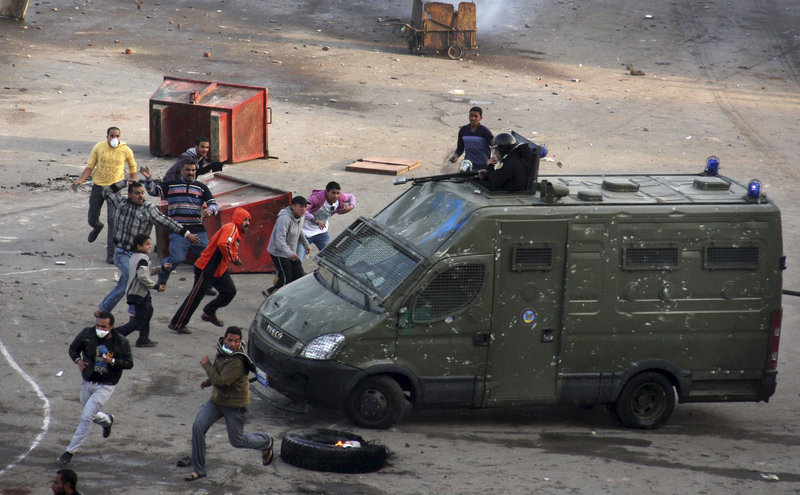CAIRO – Egypt’s grass-roots protest movement got a double boost Thursday that could energize the largest anti-government demonstrations in years — the return of Nobel Peace laureate Mohamed ElBaradei and the backing of the biggest opposition group, the Muslim Brotherhood.
The real test will be whether Egypt’s fragmented opposition can come together, with today’s rallies expected to be some of the biggest so far.
On social networking sites, there was buzz that the gatherings called after Friday prayers could attract huge numbers of protesters demanding the ouster of President Hosni Mubarak after nearly 30 years in power. Millions gather at mosques across the city on Fridays, giving organizers a vast pool of people to tap into.
Facebook and Twitter have helped drive this week’s protests. But by evening, those sites were disrupted, along with cell phone text messaging and Blackberry Messenger services.
Violence escalated Thursday at protests outside the capital.
• In the flashpoint city of Suez, along the strategic Suez Canal, protesters torched a fire station and looted weapons that they then turned on police.
• In the northern Sinai area of Sheik Zuweid, several hundred Bedouins and police exchanged gunfire, killing a 17-year-old boy. About 300 protesters surrounded a police station from rooftops of nearby buildings and fired two RPGs at it.
The 82-year-old Mubarak has not been seen in public or heard from since the protests began Tuesday with tens of thousands marching in Cairo and a string of other cities. While he may still have a chance to ride out this latest challenge, his choices are limited, and all are likely to lead to a loosening of his grip on power.
The United States, Mubarak’s main Western ally, has been publicly counseling reform and an end to the use of violence against protesters, signs the Egyptian leader may no longer be enjoying Washington’s full backing.
In an interview broadcast live on YouTube, President Obama said the anti-government protests filling the streets show the frustrations of Egypt’s citizens. “It is very important that people have mechanisms in order to express their grievances,” he said.
Noting that Mubarak has been “an ally of ours on a lot of critical issues,” Obama added: “I’ve always said to him that making sure that they’re moving forward on reform, political reform and economic reform, is absolutely critical to the long-term well-being of Egypt.”
In a move likely to help swell the numbers on the streets, the Muslim Brotherhood ended days of inaction to throw its support behind the demonstrations. On its website, the outlawed group said it would join “with all the national Egyptian forces, the Egyptian people, so that this coming Friday will be the general day of rage for the Egyptian nation.”
For the Brotherhood, still smarting from their recent defeat in a parliamentary election marred by fraud, the protests offer a rare opportunity to seize on what is increasingly shaping up as the best shot at regime change since Mubarak came to office in 1981.
The Brotherhood’s support and the return of ElBaradei were likely to energize a largely youth-led protest movement that has shaken assumptions that Mubarak’s security apparatus can keep a tight lid on popular unrest.
ElBaradei, the former head of the U.N. nuclear watchdog and a leading Mubarak opponent, has sought to recreate himself as a pro-democracy campaigner in his homeland. He is viewed by some supporters as a figure capable of uniting the country’s fractious opposition and providing the movement with a road map for the future.
Send questions/comments to the editors.



Success. Please wait for the page to reload. If the page does not reload within 5 seconds, please refresh the page.
Enter your email and password to access comments.
Hi, to comment on stories you must . This profile is in addition to your subscription and website login.
Already have a commenting profile? .
Invalid username/password.
Please check your email to confirm and complete your registration.
Only subscribers are eligible to post comments. Please subscribe or login first for digital access. Here’s why.
Use the form below to reset your password. When you've submitted your account email, we will send an email with a reset code.